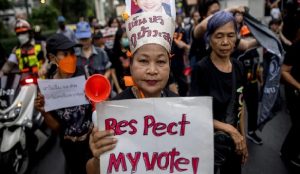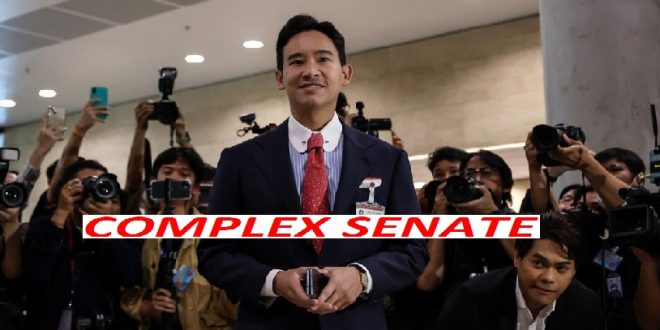17-06-2024
BANGKOK: Thailand’s nearly one-month-long Senate selection process kicked off last week, amid accusations that the system is skewed in favor of the conservative establishment, and as legal threats against the opposition risk derailing tentative steps back towards democracy.
 After seizing power in a 2014 coup, the Thai military directly appointed 250 people to the upper house in a move seen as an attempt to stymie meaningful political reform as the country transitioned back to a flawed democracy. After last year’s election, the senators blocked the progressive Move Forward Party (MFP) from forming a government, even though it had won the most seats in parliament and the largest share of the vote.
After seizing power in a 2014 coup, the Thai military directly appointed 250 people to the upper house in a move seen as an attempt to stymie meaningful political reform as the country transitioned back to a flawed democracy. After last year’s election, the senators blocked the progressive Move Forward Party (MFP) from forming a government, even though it had won the most seats in parliament and the largest share of the vote.
The Senate’s role in choosing the prime minister was temporary, however, as was its direct appointment by the military. This month a new batch of 200 senators is being selected from the leaders of key industries, in a complicated weeks-long process where only registered candidates are allowed to vote.
Candidates must be over 40 years old, have 10 years of experience in their field, not be a current member of a political party, and pay a registration fee of 2,500 baht ($68). Ten candidates will be selected from 20 occupational groups, including government, law, education, arts and culture, and women’s affairs. The final round of voting is expected on June 26, with results announced on July 2.
“The new lot of senators will have two key roles,” said Thitinan Pongsudhirak, a professor and senior fellow at the Institute of Security and International Studies at Chulalongkorn University in Bangkok.
“Constitutional change requires one-third of the 200 new senators. Equally important, the new senators will have oversight over appointments of the Election Commission and Constitutional Court.”
The current constitution was promulgated under the military in 2017, and calls for it to be amended or scrapped have grown in recent years. Rulings by the Election Commission and Constitutional Court, meanwhile, have seen pro-democracy political candidates and parties dissolved and banned.
 Most recently, they have turned their attention to MFP. The Election Commission recommended that the Constitutional Court dissolve the progressive party based on its calls to reform the controversial lese-majesty law, which criminalizes criticism of the monarchy. The Constitutional Court is still deliberating and could announce its decision on Tuesday. It previously ruled in January that MFP’s reform attempts were tantamount to attempting to overthrow the monarchy.
Most recently, they have turned their attention to MFP. The Election Commission recommended that the Constitutional Court dissolve the progressive party based on its calls to reform the controversial lese-majesty law, which criminalizes criticism of the monarchy. The Constitutional Court is still deliberating and could announce its decision on Tuesday. It previously ruled in January that MFP’s reform attempts were tantamount to attempting to overthrow the monarchy.
Thitinan said that given the continued importance of the Senate, it was “being contested fiercely”.
“There will likely be moves by the conservative establishment, including the Election Commission, to make sure the Senate does not end up with enough progressive voices to change the constitution,” he said.
Even the constitutionality of the senate selection has been challenged, with the Constitutional Court expected to deliver a verdict on its legality on Tuesday morning.
Ruchapong Chamjirachaikul, a member of the legal advocacy group iLaw, said the process was “neither fair nor democratic” and that was intentional.
“The problems you see in the process are a feature not a bug… a lot of them are by design,” he said, adding that the process should not be called an “election” but a “selection”.
Chamjirachaikul said his team has already received some reports of irregularities, like former generals registering to represent the agriculture sector, or people being offered 10,000 baht ($270) to register and vote for a specific candidate. (Int’l News Desk)
 Pressmediaofindia
Pressmediaofindia




